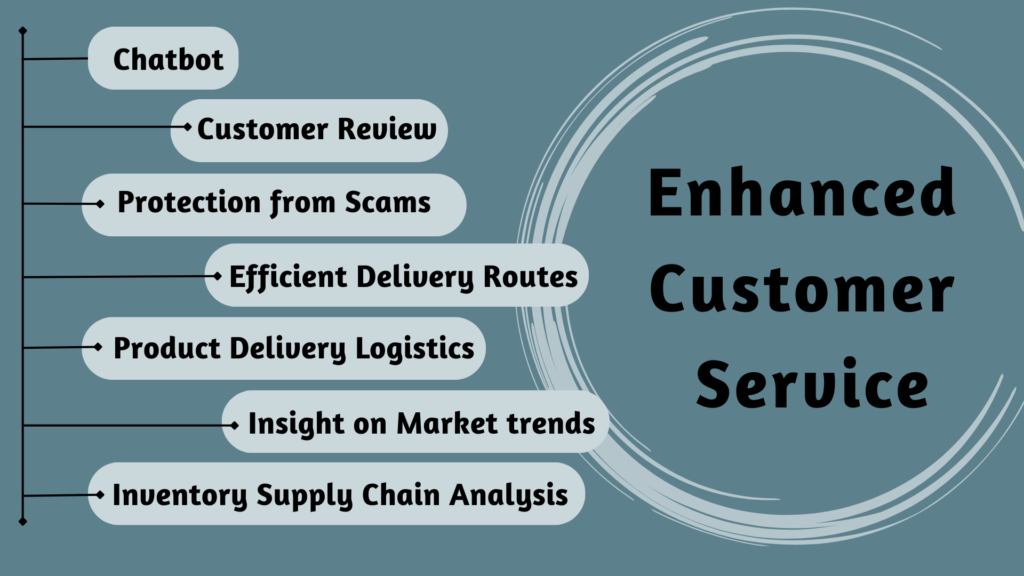In the contemporary digital landscape, AI ecommerce is rapidly becoming the cornerstone of modern shopping, revolutionizing not only our purchasing patterns but also our interactions with online retailers. As technology continues its relentless march forward, the fusion of artificial intelligence within the realm of AI ecommerce business is unequivocally acting as a catalyst for transformation. Its effects are far-reaching, promising tailor-made shopping experiences, amplified operational efficiency, and a notable upsurge in customer satisfaction. In the following discourse, we will embark on an exploration of the profound implications stemming from the adoption of AI in AI ecommerce and how it is actively shaping the future of online shopping.
The Rise of AI in Ecommerce
AI eCommerce business has borne witness to an unprecedented surge in recent years, with the global pandemic acting as a catalyst, expediting the transition towards online shopping. In a landscape replete with millions of products accessible at the mere click of a button, consumers often find themselves navigating a daunting labyrinth of choices. This is precisely where AI eCommerce business steps in, assuming the pivotal role of a valued assistant.
Artificial intelligence in ecommerce, as a multifaceted domain, encompasses a diverse array of cutting-edge technologies and applications. All of these innovations share a common aim: to refine and elevate the online shopping experience. From machine learning algorithms and natural language processing to computer vision and recommendation engines, Artificial intelligence in ecommerce constitutes a versatile toolkit employed by e-commerce enterprises, empowering them to establish and sustain a competitive advantage in the marketplace.
Personalized experiences
Leveraging AI in ecommerce offers a remarkable advantage by delivering highly personalized shopping experiences. Through the intricate analysis of customer data, encompassing browsing history, purchase behavior, and demographic details, AI algorithms can craft individualized product recommendations.
Consider a scenario where you explore an ecommerce website using AI in eCommerce, algorithms can promptly propose products grounded in your prior purchases or items you’ve displayed an interest in. This not only heightens the convenience of your shopping experience but also significantly bolsters the probability of completing a purchase. Customers wholeheartedly embrace these tailored suggestions, recognizing the valuable time and effort saved in their quest for the perfect products.
Furthermore, thanks to using AI in eCommerce, chatbots and virtual assistants infused with AI capabilities are at the forefront of delivering real-time customer support. They adeptly field inquiries, proffer product recommendations, and even facilitate the checkout process. These chatbots remain on standby 24/7, guaranteeing that customers access assistance precisely when they require it.
Enhanced Customer Service

AI e-commerce business is not limited to providing recommendations and assistance. In various facets, artificial intelligence contributes to the enhancement of customer service. One noteworthy aspect is natural language processing, which empowers chatbots to comprehend and address customer inquiries in a manner reminiscent of human interactions.
Moreover, AI plays a pivotal role in observing and closely examining customer feedback and reviews. Utilizing sentiment analysis tools, it discerns the sentiments and emotions expressed by customers regarding products and services, aiding companies in gauging the customer experience accurately. This invaluable feedback loop empowers eCommerce enterprises to perpetually fine-tune their offerings, ultimately delivering superior customer experiences.
Leveraging AI in e-commerce reshapes how companies conduct inventory management, optimize supply chains, and enhance operational efficiency. The application of predictive analytics, powered by using AI in e-commerce, enhances the accuracy of demand forecasting, substantially reducing the risks associated with excessive overstocking or inadequate stocking of products. This not only translates into cost savings but also ensures the timely and efficient fulfillment of customer orders.
Furthermore, the integration of AI in e-commerce extends to the optimization of product delivery logistics. Through the utilization of smart routing algorithms, using AI in e-commerce enables the determination of the most efficient delivery routes, resulting in notable reductions in delivery times and associated costs. This optimization serves as a boon for both the e-commerce company and its valued customer base.
As more people shop online, there’s a higher chance of scams. AI is like a superhero in this situation, it makes things safer and stops the bad guys. AI uses smart computer programs to look at shopping transactions in real-time and find anything that seems suspicious. When it finds something fishy, it raises a red flag, and provides protection from Scams. This keeps both the online store and the customers safe from online bad guys who want to harm them.
Artificial intelligence in Ecommerce provides companies with valuable insights into customer behavior and market trends. AI processes a wealth of data to uncover emerging trends, customer preferences, and opportunities for improvement in the market.
For instance, online shops use AI to see how people’s likes change and then give people what they want.
Emerging Horizons of AI E-commerce
AI in online shopping is still in its early stages, with significant room for growth as technology advances.
For instance, voice-activated assistants like Amazon’s Alexa and Google Assistant are slowly making their mark in the shopping landscape. You can interact with them to discover desired items, make purchases, and even track their delivery status. This makes shopping easier.
AR technology helps you see how things will look in your home before you buy them. Like, you can use your phone to check if furniture fits in your room or try on virtual clothes. AI makes this even better, so you’ll feel more sure about shopping online.
In Sustainable Shopping AI can play a pivotal role in helping shoppers make environmentally conscious choices. AI algorithms can meticulously analyze product information and offer shoppers valuable insights into a product’s environmental impact. This approach to Sustainable Shopping can significantly influence purchasing decisions and effectively drive demand for eco-friendly products.
Challenges and Ethical Considerations
Although AI brings many advantages to e-commerce, there are also important issues to think about. One of them is privacy. When companies gather and study customer information to offer personalized experiences, it can raise privacy worries. Finding the right balance between personalization and respecting people’s privacy is an ongoing challenge.
Moreover, AI can unintentionally make unfair product suggestions, like showing certain products more to one gender or race. This is a risk that needs attention. Ecommerce companies must ensure that their AI algorithms are fair and unbiased to avoid discrimination and exclusion.
To wrap things up, AI in ecommerce is reshaping online shopping significantly. Artificial intelligence is enriching personalization, enhancing customer service, streamlining supply chains, and offering invaluable insights into customer behavior and market trends. We can anticipate more creative ways AI can be used in the e-commerce sector, continuing to change how we shop online. Nonetheless, businesses need to take ethical matters and privacy issues seriously, ensuring that AI-driven e-commerce remains a positive force in the digital economy.

